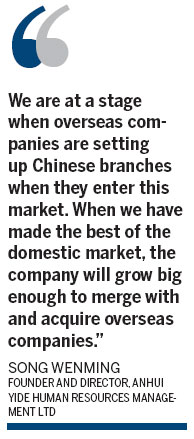Calling for new type of industry
Updated: 2013-06-17 07:36
By Shi Jing in Hefei, Anhui province (China Daily)
|
||||||||
|
Staff at a business call center in Nanjing, capital city of Jiangsu province, answering inquiries raised by customers from inside and outside the country. Business outsourcing has allowed companies to split services into components that can be subcontracted and performed in the most efficient and cost-effective way. Provided to China Daily |
Anhui capital joins Chinese model cities in featuring BPO services
Telephones ring nonstop everywhere in the spacious glass-walled modern office overlooking a relatively less developed neighborhood. Staff greet their customers over their headphones with the words "Hello sir/madam. How can I help you?" while quickly typing on their computers and searching for the required product information. The boss sits opposite his workers, checking out how everyone is doing. Welcome to a setting similar to the US television sitcom Outsourced that was first broadcast three years ago.
The situation comedy is set in a call center in Mumbai, India, where an American novelties company has recently outsourced its orders processing.
In his bestselling book The World is Flat: A Brief History of the Twenty-First Century, Thomas Friedman recounts a journey to Bangalore, India, and points out that outsourcing has allowed companies to split services into components that can be subcontracted and performed in the most efficient and cost-effective way.
Of course India is known for its business process outsourcing industry thanks to its language advantages, but now it is also taking place in the inland cities of China. Hefei, the capital city of Anhui province has pioneered the oriental idea the world is "flat".
There are three business processing outsourcing industrial parks in Hefei, namely Hefei High-Tech Industry Area, Hefei (Shushan) E-commerce Industrial Park and the International Business Outsourcing Industrial Park of Hefei Lakeshore New District, with the latter one developing the most rapidly.
Having set foot in the Lakeshore New District in May last year, leading Chinese online travel service provider eLong Inc quickly expanded its call center team in Hefei from zero to the current 1,300 people. Ding Haochuan, vice-president of operations at the company, said it aims to increase the number to 1,500 by the end of this year.
"At present, our call center in Hefei is regarded as mid-level in terms of size compared with larger businesses such as insurance companies or telecommunication operators. But, over time, we hope to increase the headcount to about 3,000 in the long run. It is not a very large number because you can't expand recklessly," he said.
Elong's call center is the company's second, the first being in Beijing, where it is based. There are about 1,000 operators working in the capital's call center. Ding said they would like to establish two core centers in China, both of which will be complementary to each other. At the same time, having two centers will help to ensure the security of users' information.
The cost of the Hefei call center is about 20 percent less of that in Beijing, according to Ding. But he added that this is not the only reason that they have chosen to settle down here. To have the right people working for the call center weighs as much.
"Hefei is known as a city of scientific technology and education. The large number of university graduates here provides us with ideal candidates for the call center," he said, adding that the convenient transportation to more developed Jiangsu province and Shanghai facilitates communication between talented people.

The local government has also made great efforts to attract companies to settle here. Apart from providing favorable conditions regarding rental tax and construction supporting facilities, the government has also established the business process outsourcing centers right in the center of the city, thereby providing lively attractions for workers here, Ding added.
The local government of Hefei mapped out a goal of building the city into China's call center capital in July 2010. Local authorities were ambitious enough to expand the scale to 100,000 customers within five years. It is also the government's goal to make business process outsourcing one of its signature industries.
Overall, there are already 21 model cities in China featuring BPO services. Hefei, not only enjoys convenient transportation to the developed Yangtze River Delta region but also boasts a sufficient supply of qualified candidates for call center workers.
"At present, there are four science and technology bases in Hefei. More than 60 colleges and universities in Anhui province will provide the people call centers need," said Wu Songjiang, director of the BPO work office at Hefei Bureau of Commerce.
The relatively lower business cost of Hefei has also attracted companies to set up here. The Lakeshore District aspires to grow into an international financial BPO center with the cooperation of Shanghai Pudong Lujiazui financial district.
The next stage of development of the Lakeshore District, Wu explained, is to attract the 14 major commercial banks in China including Industrial and Commercial Bank of China, Bank of China, and Agricultural Bank of China to set up their call centers here. Also those of insurance and securities companies as well as the telecommunication companies already here.
The establishment of call centers and the development of the BPO industry in Hefei is in line with the local government's call for an industrial transformation.
"The place where most of the call centers now stand used to be industrial parks that became outdated and were torn down. The local government planned to renovate the area into a modern industrial park that combines urban life with industry. The service industry was the best solution," said Wu.
Hefei Suntek Lianchuang Investment Management Co, which is mainly responsible for the investment promotion of the call centers, met with little resistance, largely because there was a clear-cut plan for the entire project.
"The decision was not made by only one person. It was a top-down process. We spent at least eight months in discussing the plans for the call centers with the Hefei government. We emerged with large-scale plans for the Lakeshore District as well as the entire industry. Everything then operated according to the market," said Wu Ruoyun, general manager of Suntek.
When there is a detailed plan, everything tends to go smoothly. Within three years, the Lakeshore district was in full swing. The 28-story office building in which Suntek is now based was fully built within 10 months.
Of course, Hefei does not provide the lowest prices in terms of labor. But the local government seized the right timing for an industrial transformation to BPO in 2000, Wu explained. "While the more developed coastal cities are now engaging in businesses requiring many more techniques, it was the best time for Hefei take over their previous business", she said.
As the call centers develop rapidly in Hefei, the next question to ask is, "What should come next?" Song Wenming, founder and director of Anhui Yide Human Resources Management Ltd, said it is high time much attention is paid to the rising labor costs here.
"A worker who speaks fluent English is paid around 6,000 yuan ($979) a month in Hefei, which is comparatively quite a lot. We conducted research in the Philippines in February this year. A worker at a call center in Manila is paid 4,500 yuan a month. In this sense, China has already lost its competitive edge in terms of lower labor costs to Southeastern Asian countries," said Song.
There is a long-standing myth in China that people are obsessed with the astronomical numbers of exports. In the BPO industry, people are still working hard on offshore businesses. But, according to Song, it is the domestic market that BPO industries should really keep an eye on.
"We cannot stay at the preliminary stage when everybody is still in cheaply paid work such as writing software code. We are at a stage when overseas companies are setting up Chinese branches when they enter this market. When we have made the best of the domestic market, the company will grow big enough to merge with and acquire overseas companies. This is the right path that BPO companies should take," he said.
shijing@chinadaily.com.cn
|
An employee on the phone as she works at an SPi Global call center in Manila, capital of the Philippines. Manila-based SPi Global's 18,000 workers handle customer support, technical problems and other tasks for overseas clients. India, the Philippines and some other Asian economies are known for their business process outsourcing industry thanks to their English language advantages. Now the trend is also taking place in the inland cities of China. |
(China Daily USA 06/17/2013 page15)

 Michelle lays roses at site along Berlin Wall
Michelle lays roses at site along Berlin Wall
 Historic space lecture in Tiangong-1 commences
Historic space lecture in Tiangong-1 commences
 'Sopranos' Star James Gandolfini dead at 51
'Sopranos' Star James Gandolfini dead at 51
 UN: Number of refugees hits 18-year high
UN: Number of refugees hits 18-year high
 Slide: Jet exercises from aircraft carrier
Slide: Jet exercises from aircraft carrier
 Talks establish fishery hotline
Talks establish fishery hotline
 Foreign buyers eye Chinese drones
Foreign buyers eye Chinese drones
 UN chief hails China's peacekeepers
UN chief hails China's peacekeepers
Most Viewed
Editor's Picks

|

|

|

|

|

|
Today's Top News
Shenzhou X astronaut gives lecture today
US told to reassess duties on Chinese paper
Chinese seek greater share of satellite market
Russia rejects Obama's nuke cut proposal
US immigration bill sees Senate breakthrough
Brazilian cities revoke fare hikes
Moody's warns on China's local govt debt
Air quality in major cities drops in May
US Weekly

|

|









